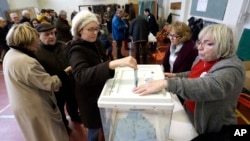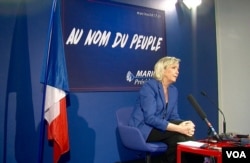Five years after a triumphant electoral sweep that returned it to power for the first time in a decade, France's ruling Socialist Party is weak, deeply unpopular and ideologically divided ahead of the first round Sunday of presidential primaries. Some even warn it risks implosion.
Voters are seeking other faces and parties after a leftist tenure that saw three major terrorist attacks, record unemployment and the fallout of Europe's migrant crisis, which left its mark on the streets of Paris and in Calais' now-dismantled Jungle camp.
The far-right National Front party is widely expected to dominate the first round of presidential elections in April, reflecting a wider populist backlash in Europe and the U.S., where President Donald Trump took office Friday.
"There's a distrust, a dearth of support for the left for a number of reasons," said analyst Jean Petaux of Sciences Po Bordeaux University. "Some believe it betrayed its leftist ideals, others that it didn't go far enough in enacting reforms."
Hollande steps aside
So unpopular is President Francois Hollande that he announced last month he would not seek reelection.Those on the ballot for the two-round leftist primaries — the runoff is February 29 — include former Prime Minister Manuel Valls, three former ministers and three members from other leftist parties.
While the vote aims to select a leftist standard-bearer, any French voter can participate for the price of just over $2. The conservatives held their own vote last November, electing former Prime Minister Francois Fillon by a wide margin.
Other popular politicians have opted out of the primaries, including far-left firebrand Jean-Luc Melenchon and Emmanuel Macron, Hollande's ex-protege and economy minister who is surging in the polls.
In debates, the candidates have clashed on such issues as social charges and immigration. Valls defends the government's migrant policy, even though it has taken in just 5,000 asylum seekers since 2015 — far fewer than the 30,000 it promised to accept.
Other leftist candidates have called for more generous policies, with ex-minister Benoit Hamon calling for a humanitarian visa for asylum-seekers.
Liberal policies
Their positions stand in sharp contrast to those of France's two current front-runners: Fillon, who wants to establish immigration quotas, and far-right leader Marine Le Pen, whose anti-immigrant, anti-Europe, protectionist discourse is resonating among many voters.
Terrorism is another top issue, with France's state of emergency extended through the presidential and June legislative elections to follow.
The far right has slammed the government for being soft on terror, while rights groups have criticized new measures it has adopted, such as wider leeway for house arrests and searches, as overly tough and discriminatory.
Both Fillon and Le Pen also emphasize France's Christian roots and raise alarm at the overt manifestation of Islam through veils and the controversial burkini, an issue that has divided the left.
"When you ask people about their voting priorities, many will say the economy and unemployment, but very soon you get to the issue of national security," said Paris-based analyst Bruno Cautres. "It's going to reward candidates that have taken tough positions on it. You can see that with Francois Fillon, and also with Marine Le Pen."
Valls is taking a hard line on both immigration and national security, defending the government's record that included trying to strip dual nationals convicted of terrorism of their citizenship — a proposal that eventually was dropped.
Dim prospects
While Valls is expected to win the first round of voting, analysts predict he will lose the runoff to a more left-leaning candidate, either Hamon or flamboyant former Economy Minister Arnaud Montebourg, both fans of U.S. Democratic presidential candidate Bernie Sanders.
Yet most believe the winner stands little chance of making it to the presidential runoff in May, much less winning it.
Instead, polls point to conservative Fillon, or possibly even Macron, who is running as an independent, prevailing against the far-right's Le Pen.
Hollande's presidency has been "an immense waste," lamented the leftist mayor of Paris, Anne Hidalgo, in an interview with Le Monde newspaper, saying it had led the left "to a state of absolute confusion."
Analyst Petaux believes history will judge Hollande more kindly. Still, if the Socialists lose power this year, as expected, he believes the party will be forced to reflect and rebuild.
"The party needs to work on transforming itself, a bit like under Tony Blair with New Labor," Petaux said of the former U.K. prime minister, who helped to salvage and rebrand his battered party in the 1990s. "There we saw a real ideological revolution."





